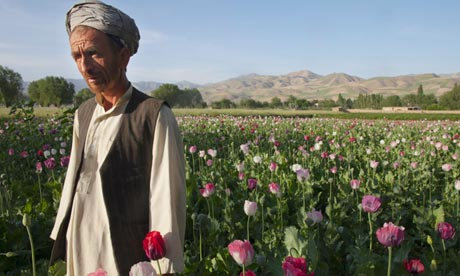Emma Graham-Harrison
The amount of Afghan farmland planted with opium poppies has increased by nearly 20% this year, after high prices in 2011 tempted more farmers into growing the drug.

An Afghan poppy farmer: instability in the region has made the drug a valuable source of income for many farmers. (Photo: Paula Bronstein/Getty Images)
Blight and bad weather meant the harvest of opium in the world's biggest producer of "black gold" fell by a third, according to the United Nations annual opium survey. But in the longer run that shortage could help keep prices near record highs, fuelling further expansion of poppy farming.
"High opium prices were a main factor that led to the increase in opium cultivation", said Yury Fedotov, head of the UN Office on Drugs and Crime (UNODC), in a statement. Despite the fall in actual production, the crop was still worth $700m this year.
Concern about the future has helped push up prices for opium, which is easily transportable and can be preserved for years. In a country with a limited and unreliable banking system, these factors have made the valuable drug a source of income for many farmers and traders.
"People are still hedging for an insecure future, so there is lots of speculation. Prices quietened in recent months but still are double what the normal economic price should be," said Jean-Luc Lemahieu, Afghanistan director for UNODC.
"We are afraid that eventually lower production this year, combined with the still speculative mood overall, mean prices will inflate, which in turn will encourage more production in the coming year."
Around half of Afghanistan's provinces grew poppies in 2012, the same as last year, but the amount of farmland turned over to the drug is closer to levels seen nearly five years ago. Farmers this year earned $200 a kilogram for dry opium, more than a policeman's monthly wage.
The spread of poppy farming is bad news for efforts to control trade in a drug that provides millions of dollars to the Taliban, and helps fuel massive corruption across the Kabul-based government, undermining its legitimacy.
Opium production is closely linked to insecurity, with the vast majority of poppy fields being in areas across the south and west of Afghanistan where there is little government control, a lot of organised crime and high levels of violence. Half of the crop is grown in Helmand province, where most British soldiers deployed to Afghanistan have fought.
Government subsidies and aggressive eradication programmes have persuaded farmers in the most fertile areas by the Helmand river to grow food crops, but overall more land was sown with poppies across the province than in 2011.
Afghan officials dug up more than twice as many fields this year compared with 2011, but this was equivalent to just 6% of the total national crop.
Lemahieu warned it would take time to wean farmers, and the Afghan economy, off the drug, even if the government responded strongly to the rapid spread of poppy farming.
"Are we alarmed? For sure. Are we panicked? No, because we know what needs to be done, and we hope that those alarming figures will give another incentive to the government," he told the Guardian. "As proven to its own peril, narcotics [control] today is still too much considered a footnote.
"The art is to induce dramatic change without destabilising the government or the economics of the country. This is possible, but takes time."



